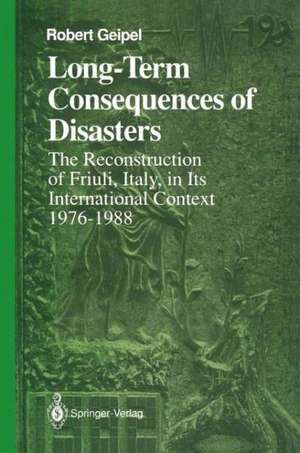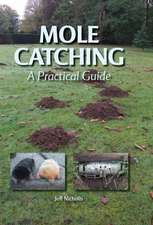Long-Term Consequences of Disasters: The Reconstruction of Friuli, Italy, in Its International Context, 1976–1988: Springer Series on Environmental Management
Autor Robert Geipelen Limba Engleză Paperback – 26 sep 2011
Din seria Springer Series on Environmental Management
- 18%
 Preț: 1230.84 lei
Preț: 1230.84 lei - 15%
 Preț: 642.18 lei
Preț: 642.18 lei - 18%
 Preț: 1236.51 lei
Preț: 1236.51 lei - 18%
 Preț: 953.82 lei
Preț: 953.82 lei - 18%
 Preț: 779.08 lei
Preț: 779.08 lei - 15%
 Preț: 642.83 lei
Preț: 642.83 lei - 15%
 Preț: 677.85 lei
Preț: 677.85 lei - 15%
 Preț: 640.06 lei
Preț: 640.06 lei - 15%
 Preț: 640.06 lei
Preț: 640.06 lei - 15%
 Preț: 635.47 lei
Preț: 635.47 lei - 15%
 Preț: 505.49 lei
Preț: 505.49 lei - 18%
 Preț: 1236.69 lei
Preț: 1236.69 lei - 18%
 Preț: 962.98 lei
Preț: 962.98 lei - 15%
 Preț: 640.06 lei
Preț: 640.06 lei - 15%
 Preț: 638.24 lei
Preț: 638.24 lei - 15%
 Preț: 634.68 lei
Preț: 634.68 lei - 18%
 Preț: 959.82 lei
Preț: 959.82 lei - 15%
 Preț: 641.03 lei
Preț: 641.03 lei - 15%
 Preț: 653.46 lei
Preț: 653.46 lei -
 Preț: 399.50 lei
Preț: 399.50 lei -
 Preț: 387.38 lei
Preț: 387.38 lei - 18%
 Preț: 950.66 lei
Preț: 950.66 lei - 15%
 Preț: 651.99 lei
Preț: 651.99 lei - 18%
 Preț: 957.62 lei
Preț: 957.62 lei - 15%
 Preț: 647.40 lei
Preț: 647.40 lei - 18%
 Preț: 945.79 lei
Preț: 945.79 lei - 18%
 Preț: 1218.69 lei
Preț: 1218.69 lei - 15%
 Preț: 634.68 lei
Preț: 634.68 lei - 18%
 Preț: 1225.79 lei
Preț: 1225.79 lei - 15%
 Preț: 657.25 lei
Preț: 657.25 lei -
 Preț: 397.38 lei
Preț: 397.38 lei -
 Preț: 404.89 lei
Preț: 404.89 lei - 15%
 Preț: 641.03 lei
Preț: 641.03 lei - 15%
 Preț: 650.86 lei
Preț: 650.86 lei - 15%
 Preț: 711.21 lei
Preț: 711.21 lei - 15%
 Preț: 643.16 lei
Preț: 643.16 lei - 18%
 Preț: 724.80 lei
Preț: 724.80 lei
Preț: 635.47 lei
Preț vechi: 747.61 lei
-15% Nou
Puncte Express: 953
Preț estimativ în valută:
121.59€ • 127.30$ • 100.61£
121.59€ • 127.30$ • 100.61£
Carte tipărită la comandă
Livrare economică 05-19 aprilie
Preluare comenzi: 021 569.72.76
Specificații
ISBN-13: 9781461277828
ISBN-10: 1461277825
Pagini: 196
Ilustrații: XX, 171 p.
Dimensiuni: 155 x 235 x 10 mm
Greutate: 0.28 kg
Ediția:Softcover reprint of the original 1st ed. 1991
Editura: Springer
Colecția Springer
Seria Springer Series on Environmental Management
Locul publicării:New York, NY, United States
ISBN-10: 1461277825
Pagini: 196
Ilustrații: XX, 171 p.
Dimensiuni: 155 x 235 x 10 mm
Greutate: 0.28 kg
Ediția:Softcover reprint of the original 1st ed. 1991
Editura: Springer
Colecția Springer
Seria Springer Series on Environmental Management
Locul publicării:New York, NY, United States
Public țintă
ResearchCuprins
I. Introduction.- 1. Topics of Long-Term Studies in Hazard Research.- 2. Open Questions in Hazard Research.- 3. Specific and Broadly Representative Elements in the Reconstruction of Friuli.- 4. Literature on Friuli and the Earthquakes in Friuli.- II. Overview of the Initial Conditions for Reconstruction.- 1. Indemnification versus Insurance: Two Models of Settling Damages after Natural Disasters.- 2. The Region and the Events of 1976.- 3. Decisions on the Method and the Course of Reconstruction.- III. Effects of Provisional Housing in Prefabs: Slums of Hope or Despair.- 1. Expenditures.- 2. Demolition.- 3. The Problem of the “Squatters”.- 4. The Composition of the Population in the Prefab Towns.- 5. The Social Selection Process in the Prefab Towns.- 6. Prefab Settlements as Indicators of the Phases of Reconstruction.- IV. The Single Stages of Reconstruction.- 1. Reconstruction Stages and Expenditure of Funds.- 2. Critical Moments During Reconstruction.- 3. Regional Differentiation of Reconstruction.- 4. Socioeconomic Development.- 5. Differentiation of the Stages and Influential Factors.- 6. Costs of Reconstruction.- 7. Regional Differentiation of Reconstruction Costs.- 8. Change Following Disaster: A Review.- V. Reconstruction in Four Communities: A Case Study.- 1. The Situation Before the Disaster.- 2. Reconstruction Policies.- 3. Changes in Residential Structures and Settlement Patterns.- 4. The Improvement of Housing Stock.- 5. Changes in the Structure of Accommodations.- 6. Changes in the Location of Residences.- 7. Changes in Property Titles.- 8. Contentedness of the Population with Reconstruction.- 9. Change in Social Life.- VI. Changes in the Regional Structure During Reconstruction.- 1. Development of Demographic Relations.- 2. The SocioeconomicDevelopment.- 3. Cluster Analysis of Socioeconomic and Demographic Variables.- 4. Small-Scale Changes in the Regional Structure.- 5. Earthquakes, Reconstruction, and Industrial Development.- VII. Conclusions.- 1. Reconstruction Alternatives—Three Scenarios.- 2. Learning From Reconstruction: The Do’s and Don’ts of Friuli.- 3. Final Remarks.















